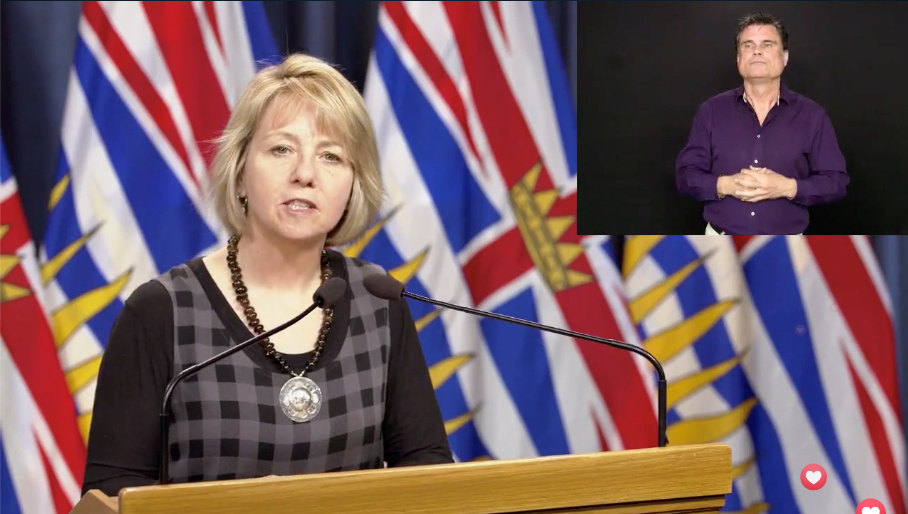There are now 1,948 confirmed cases of the COVID-19 in B.C., after health officials announced 95 new cases Saturday.
Provincial health officer Dr. Bonnie Henry reports that there are 778 cases in Vancouver Coastal Health (VCH), 853 in Fraser Health, 115 on Vancouver Island, 160 in Interior Health and 42 in Northern Health.
"Part of the reason we've had such a dramatic jump in cases today is related to the community outbreaks that we've been investigating," Henry said. Forty of the new cases are related to the ongoing outbreak at the Mission federal correctional institute in the Fraser Valley, after "extensive testing" was carried out within that facility, Henry said, including for those who were only showing minimal symptoms. That brings the total number of inmates who've tested positive to 106, in addition to 12 staff members from the facility.
Sixteen of the new cases are related to the ongoing outbreak at Superior Poultry, a chicken processing plant in Coquitlam. Meanwhile, the amount of positive cases related to the initial outbreak announced earlier this week at United Poultry Company Ltd., a Vancouver processing plant, remains steady at 35. Eleven cases connected to the Kearl Lake project in Alberta, have been confirmed to date, Henry added.
The total number of fatalities in B.C.caused by COVID-19 hit a grim milestone today, as Henry announced an additional two deaths. That brings the province's total to 100, less than a month after B.C. reported its first COVID-19-related death on March 30. Included in the two new deaths announced Saturday is B.C.'s first COVID-19-related fatality within the province's First Nations communities.
There have been no new outbreaks in long-term care facilities, while outbreaks have been declared over at 11 care facilities.
There are currently 96 people in acute care in hospital, including 41 in critical care. This marks the lowest number of hospitalized COVID-19 patients B.C. has seen this month.
However, 1,137 people who tested positive for COVID-19 have fully recovered and are no longer in isolation.
Henry also revealed that three positive cases included in B.C.'s current total have been identified in individuals who were self-isolating in one of the province's quarantine facilities. The program has been, "very effective in ensuring that everybody who's coming back to B.C., and people like our temporary foreign workers - we've had about 1,000 temporary foreign workers from Mexico who've come to B.C. to work - are being quarantined here," she said.
On Saturday, Henry acknowledged the two public health crises that B.C. is dealing with, including the overdose crisis. "Everyone in B.C. deserves to feel safe, protected and supported during these crises. Safe physical distancing and self-isolation if you're ill can be really difficult when your housing is precarious, and this is further compounded for people who may also be living with mental health and substance use or addiction issues," she said.
To that end, the province announced earlier in the day that over 1000 hotel rooms will soon be available for people living in encampments in Victoria and Vancouver. "This action is welcome news," Henry said. "It reduces the immediate health and safety risks that we know were a challenge for people living in these encampments, and it's important for us in the health sector to be sure we can support all of the needs of people as they are transitioned into more stable and important housing over the coming days, weeks, and also the months and years to come. This is not a short-term plan."
Henry also raised the issue of domestic violence in the age of physical distancing. While staying home is the best method to bend the COVID-19 curve, she said, "In many cases this has led to increased family stresses and a decrease in community connections. Unfortunately, for some being at home means not being safe," she said, adding that domestic violence is known to, potentially, increase during a crisis like the ongoing pandemic.
"If you are experiencing violence, it's not okay," Henry said. "We want you to know that you are not alone, there are resources out here, that we have, that are available for you." She urged those in immediate danger to call 911, and also cited VictimLinkBC as a toll-free, confidential resource available 24 hours a day.
"Your immediate safety is more important than physical distancing or self-isolation," she added.
Henry encourages everyone to be kind to people who have to continue to work during the pandemic, such as those working in grocery stores, pharmacies, and in health care. She adds that isolation can be challenging, and that anyone who has an underlying illness should contact a doctor through virtual care. She mentions Anxiety Canada and Bounceback BC as useful resources for mental health.
In a previous briefing, Henry noted that people should consult the province's online assessment tool if they aren't sure if they require further testing or assessment for COVID-19. She also underscored the importance of physical distancing, hand washing, covering your mouth if you cough, not touching your face and staying home if you are sick.



